7 Best Herbal Tinctures For Inflammatory Bowel Disease
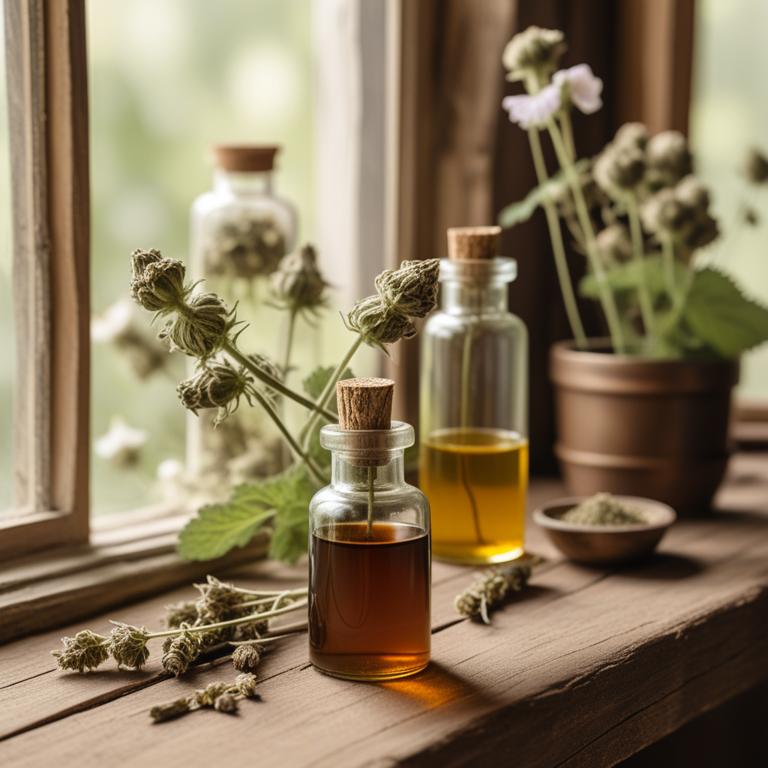
Herbal tinctures for Inflammatory bowel disease are concentrated plant extracts used to alleviate symptoms and promote healing in individuals suffering from this chronic condition.
These tinctures offer numerous benefits, including reducing inflammation, soothing digestive issues, and enhancing overall gut health.
Examples of herbal tinctures used to treat Inflammatory bowel disease include Peppermint tincture, which relaxes the muscles in the digestive tract, Aloe Vera tincture, which soothes and protects the mucous membranes, Marshmallow root tincture, which forms a protective barrier in the gut, Slippery Elm tincture, which calms inflammation and irritation, and Ginger tincture, which reduces nausea and digestive discomfort.
By incorporating these herbal tinctures into their treatment regimen, individuals with Inflammatory bowel disease may experience improved symptoms and enhanced quality of life.
According to "Expert review of gastroenterology & hepatology", tinctures for inflammatory bowel disease may be beneficial as they contain plant-derived natural compounds that can exert anti-inflammatory and immunoregulatory effects, modulate intracellular signaling pathways, and improve gut microbiota, potentially leading to remission.
Below there's a list of the 7 best herbal tinctures for inflammatory bowel disease.
- 1. Curcuma longa tinctures
- 2. Cinchona officinalis tinctures
- 3. Silybum marianum tinctures
- 4. Aloe barbadensis tinctures
- 5. Zingiber officinale tinctures
- 6. Panax ginseng tinctures
- 7. Angelica sinensis tinctures
Also you may be interested in...
TODAY'S FREE BOUNDLE
Herb Drying Checklist + Herbal Tea Shopping List + Medicinal Herbs Flashcards
Enter you best email address below to receive this bundle (3 product valued $19.95) for FREE + exclusive access to The Aphotecary Letter.
$19.95 -> $0.00
1. Curcuma longa tinctures

Curcuma longa tinctures have been traditionally used to treat inflammatory bowel disease (IBD) due to their anti-inflammatory and antioxidant properties, which help to reduce inflammation and oxidative stress in the gut.
The bioactive constituents of Curcuma longa, such as curcuminoids, specifically curcumin, have been found to inhibit the production of pro-inflammatory enzymes and cytokines, thereby alleviating IBD symptoms.
The tincture of Curcuma longa helps to treat IBD by reducing inflammation, improving gut barrier function, and modulating the gut microbiome, leading to improved symptoms and quality of life.
The benefits of using Curcuma longa tinctures to treat IBD include reduced inflammation, improved gut health, and decreased reliance on conventional medications, making it a valuable natural adjunctive therapy for managing this chronic condition.
Related Study
According to "Current pharmaceutical biotechnology", Curcuma longa tinctures for inflammatory bowel disease show promising activity against the condition, requiring further investigation in preclinical and clinical studies to confirm their safety and efficacy.
2. Cinchona officinalis tinctures

Cinchona officinalis tinctures have been traditionally used to treat inflammatory bowel disease due to their anti-inflammatory and antioxidant properties, which help to reduce inflammation and oxidative stress in the gut.
The bioactive constituents of Cinchona officinalis, including quinine and quinidine, exhibit their therapeutic effects by inhibiting pro-inflammatory enzymes and promoting the production of anti-inflammatory cytokines, thus alleviating symptoms of the disease.
The benefits of using Cinchona officinalis tinctures to treat inflammatory bowel disease include reduced inflammation, improved gut health, and enhanced overall well-being.
Additionally, this herbal preparation has been found to have antimicrobial properties, which can help to prevent infections and promote a balanced gut microbiome.
Related Study
According to "Molecules (Basel, Switzerland)", Cinchona officinalis tinctures for inflammatory bowel disease may have anti-inflammatory properties due to the presence of catechins, which can regulate cell signaling pathways, cell junctions, and intestinal flora to alleviate symptoms of IBD.
3. Silybum marianum tinctures
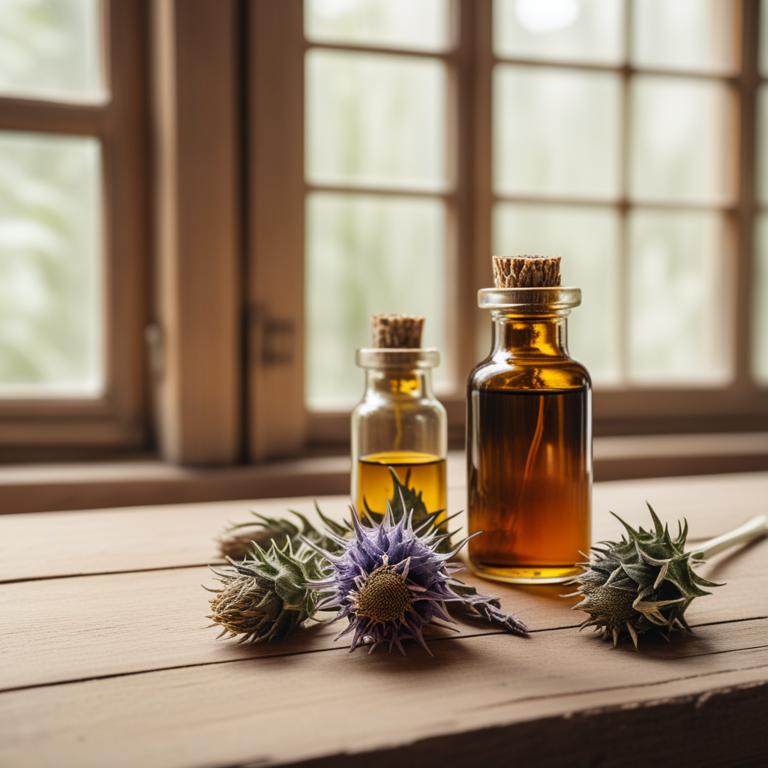
Silybum marianum tinctures have been traditionally used to treat inflammatory bowel disease (IBD) due to their anti-inflammatory and antioxidant properties.
The tinctures help to treat IBD by reducing inflammation and oxidative stress in the gut, thereby alleviating symptoms such as abdominal pain and diarrhea.
The bioactive constituents of Silybum marianum, including flavonoids, silymarin, and polyphenols, have been shown to inhibit the production of pro-inflammatory cytokines and promote the healing of the gut epithelial lining.
By using Silybum marianum tinctures, individuals with IBD can experience reduced inflammation, improved gut health, and enhanced overall well-being.
Related Study
According to the Journal of Research in Medical Sciences, Silybum marianum tinctures for inflammatory bowel disease have been found to have favorable results, including leukotriene B4 inhibition, antioxidant activity, immune system regulation of nuclear factor-kappa B, and antiplatelet activity, with no adverse events reported.
4. Aloe barbadensis tinctures
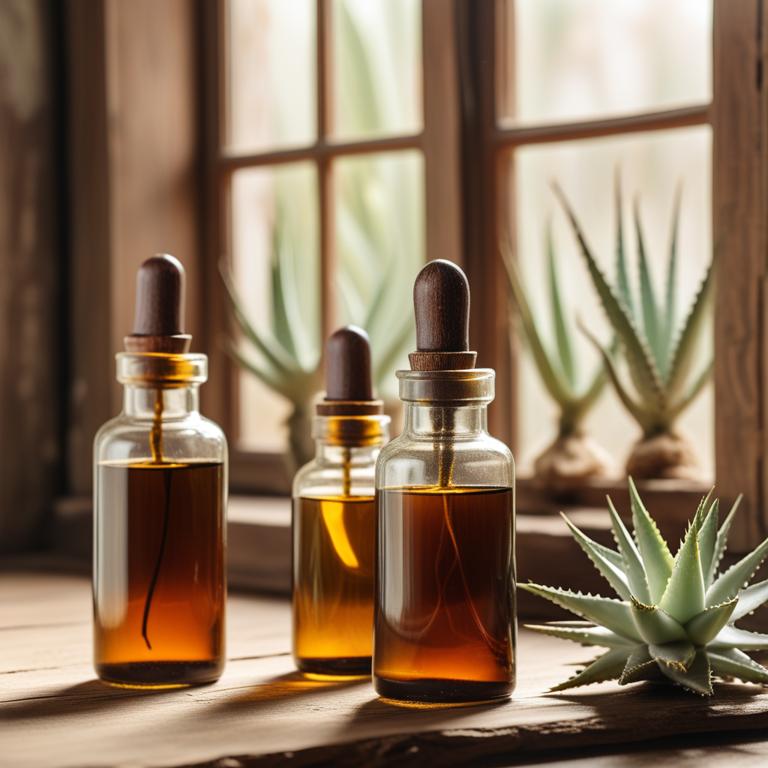
Aloe barbadensis tinctures have been traditionally used to treat inflammatory bowel disease (IBD) due to their anti-inflammatory and soothing properties.
The bioactive constituents of Aloe barbadensis, such as aloin and acemannan, help to reduce inflammation and promote healing in the gastrointestinal tract, thereby alleviating symptoms of IBD.
By reducing inflammation and promoting healing, Aloe barbadensis tinctures can help to improve the overall quality of life for individuals suffering from IBD.
The benefits of using Aloe barbadensis tinctures to treat IBD include reduced inflammation, improved digestion, and enhanced overall well-being.
Related Study
According to "Journal of Research in Medical Sciences : The Official Journal of Isfahan University of Medical Sciences", Aloe barbadensis tinctures for inflammatory bowel disease have favorable results for management through various mechanisms including leukotriene B4 inhibition, antioxidant activity, immune system regulation of nuclear factor-kappa B, as well as antiplatelet activity, with no reported unfortunate events.
5. Zingiber officinale tinctures

Zingiber officinale tinctures, derived from the rhizomes of the ginger plant, have been traditionally used to treat inflammatory bowel disease (IBD) due to their anti-inflammatory and antioxidant properties.
The bioactive constituents, including gingerols and shogaols, have been shown to inhibit the production of pro-inflammatory enzymes and cytokines, thereby reducing inflammation in the gut.
This helps to alleviate symptoms of IBD, such as abdominal pain, diarrhea, and weight loss, by promoting healing and reducing inflammation in the intestinal lining.
The benefits of using Zingiber officinale tinctures to treat IBD include reduced inflammation, improved gut health, and enhanced quality of life.
Related Study
According to "BioFactors (Oxford, England)", Zingiber officinale tinctures for inflammatory bowel disease may be beneficial due to their anti-inflammatory and anti-oxidative functions, particularly the phenolic compounds called gingerols, which inhibit various pro-inflammatory pathways and cytokines.
6. Panax ginseng tinctures
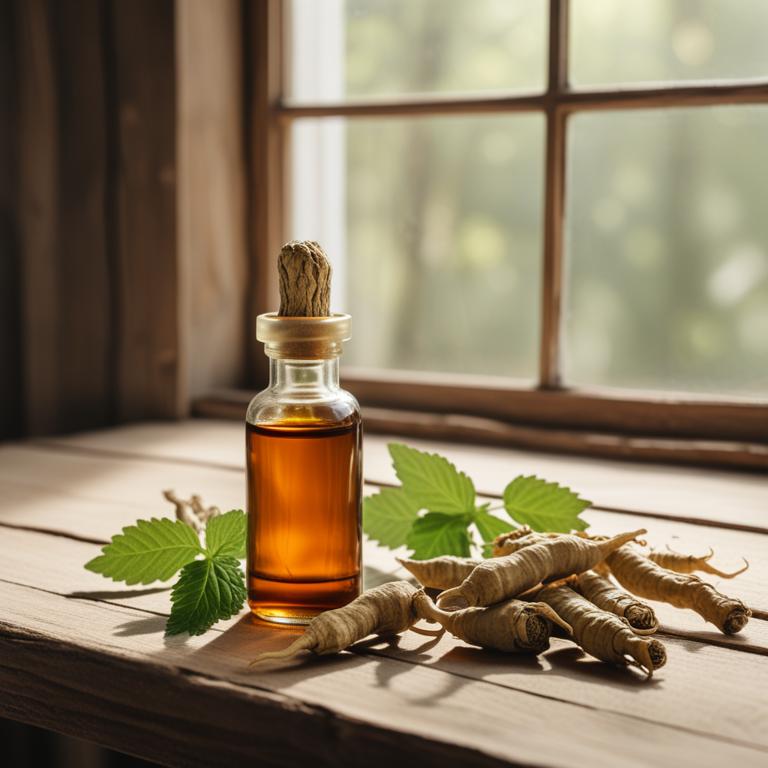
Panax ginseng tinctures have been studied for their potential in treating inflammatory bowel disease (IBD) due to their anti-inflammatory and immunomodulatory properties.
The bioactive constituents of Panax ginseng, including ginsenosides and saponins, have been shown to help reduce inflammation and modulate the immune system, which can contribute to the development and progression of IBD.
By reducing inflammation and modulating the immune response, Panax ginseng tinctures may help alleviate symptoms of IBD, such as abdominal pain and diarrhea.
The benefits of using Panax ginseng tinctures to treat IBD include reduced inflammation, improved immune function, and potential relief from symptoms, making it a promising herbal preparation for managing this condition.
Related Study
According to "Journal of research in medical sciences : the official journal of Isfahan University of Medical Sciences", Panax ginseng tinctures have favorable results for the management of inflammatory bowel disease through mechanisms including leukotriene B4 inhibition, antioxidant activity, immune system regulation of nuclear factor-kappa B, as well as antiplatelet activity.
7. Angelica sinensis tinctures
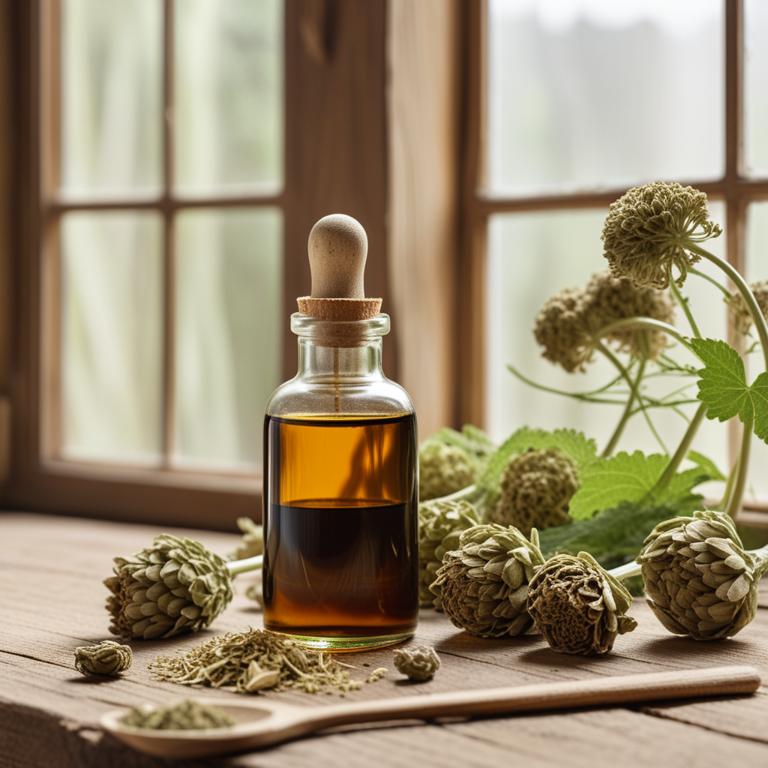
Angelica sinensis tinctures, derived from the root of the dong quai plant, have been used in traditional Chinese medicine to treat various gastrointestinal issues, including inflammatory bowel disease (IBD).
The anti-inflammatory and antioxidant properties of Angelica sinensis tinctures help to reduce inflammation and protect against oxidative stress, which contribute to the development of IBD.
The bioactive constituents, including ferulic acid, feruloylquinic acid, and ligustilide, have been shown to exhibit anti-inflammatory and antioxidant activities, which aid in the treatment of IBD.
By reducing inflammation and oxidative stress, Angelica sinensis tinctures may help alleviate symptoms of IBD, such as abdominal pain, diarrhea, and weight loss, providing relief to individuals suffering from this debilitating condition.
Related Study
According to "Nutrients", Angelica sinensis tinctures may have anti-inflammatory effects on inflammatory bowel disease, as the root water extract of Angelica sinensis has shown notable anti-inflammatory effects by inhibiting the production of pro-inflammatory cytokines and mediators in RAW 264.7 mouse macrophages.